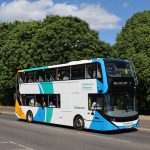Hybrid buses have one common point of criticism: Price. With its ‘hybrid lite’ idea, Daimler says that it has a kinetic energy recovery system suitable for the Mercedes-Benz Citaro that mitigates that issue
Hybrid power has a renewed advocate in Daimler Buses – but the ‘hybrid lite’ system that it unveiled last week in the Mercedes-Benz Citaro focuses more on affordability than outright fuel savings and it will, says the manufacturer, pay for itself in as little as four years.
Daimler’s latest hybrid package is a relatively simple kinetic energy recuperation system (KERS) that shares much with an electric flywheel.
Its 14kW, 200Nm motor-generator is the same one that is already used in Mercedes-Benz cars, which gives the economy of scale that is key to the short payback period.
The unit sits between the same OM 936 engine and Voith or ZF gearbox fitted to conventional Citaros, and roof-mounted supercapacitors are charged when slowing.
Energy is returned to the driveline as a ‘boost’ when the bus accelerates, reducing the load on the engine and cutting fuel consumption.
Daimler Buses Head of Marketing, Sales and Customer Services Ulrich Bastert says that a potential reduction of up to 8.5% over a Euro 6 diesel Citaro can be achieved.
Additionally, Daimler Buses will offer the KERS package in conjunction with the OM 936 G gas engine used in the Citaro NGT, giving potential for a biogas-electric mild hybrid.
‘This is a very special hybrid’
“This is a very special hybrid package. It is a convincing solution,” says Mr Bastert. Like his senior colleagues at Daimler Buses, he displayed a degree of supreme confidence in its products when talking at last week’s unveiling in Stuttgart. “We have produced the best hybrid solution. It is simple, efficient, lightweight and affordable, and it makes economy and ecology compatible.”
Daimler Buses continues to work on a battery-powered Citaro. It still regards the long-serving platform as ideal for numerous applications, and it will soon deliver the 50,000th example, a 19.73m articulated four-axle CapaCity, to Wiener Linien in Vienna.
Unlike some competitors, Daimler sees a need for an internal combustion engine in urban buses for some time yet. As a result, the Citaro hybrid is not a transitionary product on the road to zero emissions, largely thanks to its short payback time.
Another key is simplicity. The manufacturer says that no special tools or bespoke training are required for the engineers that will work on the Citaro hybrid because the motor and storage system uses 48v electrics.
The hybrid package adds 160kg to the Citaro’s unladen weight, meaning that it has a negligible effect on capacity. In diesel form, Daimler claims a maximum total capacity of 105 passengers for a 12m Citaro.
Simple steps save shekels
The hybrid system functions by reducing the imposed load on the engine during acceleration and hill climbing, but it does not work in conjunction with engine stop-start. In contrast to some other OEMs, Daimler Buses is vehemently against the idea of stop-start.
“Buses are used differently to cars or trucks and there would be many off-on cycles, which we believe would place a burden on the engine and influence wear levels. Stop-start can be counterproductive,” says Head of Development Gustav Tuschen.
“We have not targeted a full hybrid application and with maximum fuel savings. Instead, we want something that is efficient, including in terms of price. If we developed a series hybrid, we could reduce fuel consumption by 20%, but it would not be financially efficient.”
Because of that, a true diesel-electric’s energy recuperation benefits are not realised with the mild hybrid. Daimler says that braking to a halt from around 30mph is enough to fully charge the supercapacitors, and it adds that significant benefits can still be realised.
Few differences from diesel
Supercapacitors have already been seen in the bus market, and Daimler says that they are well-suited to frequent charge and depletion. They also give a long service life. Energy is stored as DC and it is converted to AC before being returned to the motor-generator. All KERS components are designed for a service life of at least a 12 years.
Daimler Buses says that, while the engine and the motor-generator work together at times of high power demand, their combined output is no higher than the engine is capable of on its own; instead, relieving the load on the engine is the focus, and so there are no worries about impact on gearbox life.
Additionally, the motor-generator gives a tiny boost at idling speed. That increases the engine’s efficiency, further benefiting fuel consumption. Like the rest of the package, it is a simple thing that further cuts the total cost of ownership.
routeone comment
In recent years Daimler Buses has typically left the early running with emerging technologies such as hybrid and full electric to other manufacturers.
Hartmut Schick, who is head of the organisation, has said on several occasions that it will only come to the table when it has a product that is refined, ready and reliable. In the mild hybrid system for the Citaro that it unveiled last week, it appears to have a product that ticks all of those boxes.
Interestingly, Gustav Tuschen says that the concept – which has more in common with a kinetic energy recovery system than a full hybrid – will be offered in other vehicles.
A variant of the new Tourismo coach will be available with the 7.7-litre OM 936 engine, raising potential for a mild hybrid coach.
























